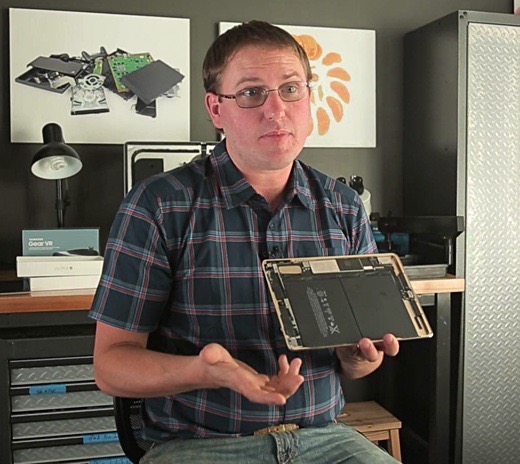SUBHEAD: The Europe Union is trying to force manufacturers to make products that can be repaired and upgraded.
By Yves Smith on 7 July 2017 for Naked Capitalism -
(http://www.nakedcapitalism.com/2017/07/eu-takes-stand-crapification.html)

Image above: "IPads are really designed to be single-use devices," says Kyle Wiens, CEO and co-founder of iFixit, "You use it until the battery wears out, and then you throw it away and you buy a new one." From (http://www.nbcnews.com/news/us-news/fix-out-product-repairs-get-tougher-new-age-obsolescence-n614916).
[IB Publisher's note: This issue is certainly not just about high-tech products. Most items that are primarily made of plastic are not repairable, and products like cheaply made garden tools are basically disosable.]
Reader Micael sent NakedCapitalism an article summarizing an EU Parliament effort to combat crapification by among other things, pushing for longer product lives and greater ease in product repair.
While this appears to be only a first step, if this initiative gets traction, it could lead to EU manufacturers gaining advantage over their US competitors.
Recall how US automakers fighting fuel economy standards worked to their long-term disadvantage, as foreign automakers got better at making vehicles that performed well from a driving and safety perspective while being more parsimonious in fuel usage.
Hopefully EU-based readers can provide input as to whether they think the other key EU-level actors will embrace this plan, and even more important, whether manufacturers are willing to move in this direction.
Notice among other things, that it opposes the use of software that forces buyers to go only to manufacturer-connected repair outlets. If you look at the text of the resolution, you can see a very long list of “having regard” clauses, which suggests a lot of groundwork has been laid.
This plan goes well beyond what the US “right to repair” advocates are seeking. If the EU moves forward, this should help the US effort considerably.
From EUBusiness:
By Yves Smith on 7 July 2017 for Naked Capitalism -
(http://www.nakedcapitalism.com/2017/07/eu-takes-stand-crapification.html)

Image above: "IPads are really designed to be single-use devices," says Kyle Wiens, CEO and co-founder of iFixit, "You use it until the battery wears out, and then you throw it away and you buy a new one." From (http://www.nbcnews.com/news/us-news/fix-out-product-repairs-get-tougher-new-age-obsolescence-n614916).
[IB Publisher's note: This issue is certainly not just about high-tech products. Most items that are primarily made of plastic are not repairable, and products like cheaply made garden tools are basically disosable.]
Reader Micael sent NakedCapitalism an article summarizing an EU Parliament effort to combat crapification by among other things, pushing for longer product lives and greater ease in product repair.
While this appears to be only a first step, if this initiative gets traction, it could lead to EU manufacturers gaining advantage over their US competitors.
Recall how US automakers fighting fuel economy standards worked to their long-term disadvantage, as foreign automakers got better at making vehicles that performed well from a driving and safety perspective while being more parsimonious in fuel usage.
Hopefully EU-based readers can provide input as to whether they think the other key EU-level actors will embrace this plan, and even more important, whether manufacturers are willing to move in this direction.
Notice among other things, that it opposes the use of software that forces buyers to go only to manufacturer-connected repair outlets. If you look at the text of the resolution, you can see a very long list of “having regard” clauses, which suggests a lot of groundwork has been laid.
This plan goes well beyond what the US “right to repair” advocates are seeking. If the EU moves forward, this should help the US effort considerably.
From EUBusiness:
Europe’s Parliament called on the Commission, Member States and producers Tuesday to take measures to ensure consumers can enjoy durable, high-quality products that can be repaired and upgraded..
At their plenary session in Strasbourg, MEPs said tangible goods and software should be easier to repair and update, and made a plea to tackle built-in obsolescence and make spare parts affordable.
77 per cent of EU consumers would rather repair their goods than buy new ones, according to a 2014 Eurobarometer survey, but they ultimately have to replace or discard them because they are discouraged by the cost of repairs and the level of service provided…
Its recommendations include:
The Parliament is asking the Commission to consider a “voluntary European label” covering, in particular, the product’s durability, eco-design features, upgradeability in line with technical progress and reparability.
- Robust, easily repairable and good quality products: “minimum resistance criteria” to be established for each product category from the design stage
- If a repair takes longer than a month, the guarantee should be extended to match the repair time
- Member states should give incentives to produce durable and repairable products, boosting repairs and second-hand sales – this could help to create jobs and reduce waste
- Consumers should have the option of going to an independent repairer: technical, safety or software solutions which prevent repairs from being performed, other than by approved firms or bodies, should be discouraged
- Essential components, such as batteries and LEDs, should not be fixed into products, unless for safety reasons
- Spare parts which are indispensable for the proper and safe functioning of the goods should be made available “at a price commensurate with the nature and life-time of the product”
- An EU-wide definition of “planned obsolescence” and a system that could test and detect the “built-in obsolescence” should be introduced, as well as “appropriate dissuasive measures for producers”.
No comments :
Post a Comment